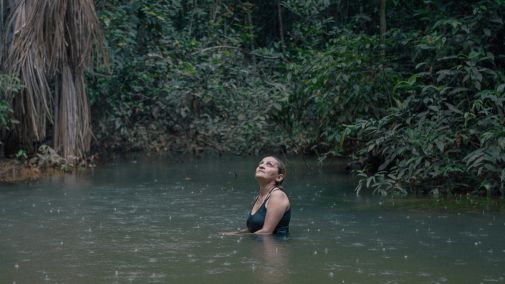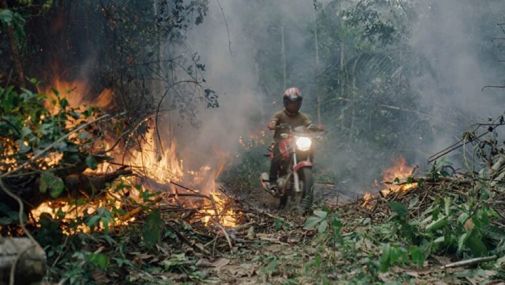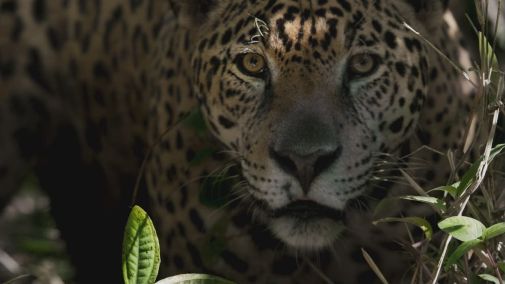Doc Corner: 'The Territory' at EarthX Festival in Dallas
 Wednesday, May 11, 2022 at 4:00PM
Wednesday, May 11, 2022 at 4:00PM By Glenn Dunks
The 2022 EarthX Film Festival is four days of film, music and interactive environmental programs and events set in the heart of Dallas Arts District, May 12-15. We were able to watch a couple of the titles including big ticket Sundance winner The Territory as well as Tigre Gente.

The first thing to notice in The Territory (tickets here) is its beauty. Filming within the Amazon rainforest will do that, of course. As will having a cinematographer for a director. But Alex Pritz’s first feature documentary as a director very quickly transcends whatever lush imagery is immediately front and center, bursting quite early with rage at the situation its Indigenous subjects are being forced to endure. New images emerge, those of burning and destruction and greed as those who live independently defiantly take protection of their block of land into their own hands.
This is an environmental film set within an increasingly small patch that—as the film begins—is the land of the Uru-eu-wau-wau people, provided under rights agreements with the Brazilian government. But the impending election threatens this life of serenity when anti-environmental rhetoric from Jair Bolsonaro threatens to bring chainsaws, bulldozers and forest burning to this idyllic slice of paradise.
Early on we are shown timelapse satellite images of the titular territory. Once just another patch of rainforest, land clearing and logging has encroached ever closer to the Uru-eu-wau-wau’s borders. Now surrounded on all sides by agriculture and farming, and with less than 200 of their people left, it seems there is little that can be done to protect this beautiful, natural landscape. And therein lies what gives The Territory its vital tension.
Like most films of this sort, the long-term vision here is remarkably distressing. The plight of the territory here isn’t unique, of course. It’s but one of many places around the world where the short-sighted greed of some (and the depressing apathy of others) mean the world is on a collision course with absolute destruction. No better is this encapsulated than in a moment where the locals run through the forest in glee, while outside a farmer sweats profusely under the sweltering sun—a manmade heat island without a tree in sight for shade. That people can’t see what this is doing to the planet is enraging, but it’s the casualness with which we see them undertake this wanton annihilation of nature that really stands out here. They just don’t care.

Pritz captures both sides of this tug-of-war, too. Nestling himself not just within the Uru-eu-wau-wau camp, but with settlers, too, who use Bolsonaro’s election as the legal go ahead to tear it down and, in one tragic case, murder those who stand in their way. The Uru-eu-wau-wau people form patrols under the leadership of newly elected 20-year-old Bitaté, utilising drones provided by city-dwelling activists to find and extract interlopers. Watching this film and it is impossible to not be devastated, but Pritz—and eventually the Uru-eu-wau-wau themselves who are forced to pick up cameras themselves once COVID hits—finds small pockets of radical hope, buried deep underneath the Amazon canopy, to ever so precariously cling onto.
As is the way with just about any enviro-centric documentary, it’s hard to imagine anybody watching this who wasn’t already well on the side of the Indigenous population. But that shouldn’t be something held about The Territory. This is an exceptionally well-made debut from Pritz, one that utilises its setting so strongly and does so from all sides. It’s true that this isn’t exactly a happy experience. But scene after scene shows us with clear eyes and full-throated rage just how the last lines of defence against the ecological destruction of our planet are operating and somewhere in that is a cinematic power that’s hard to dismiss.
The Territory will be released by National Geographic in August. It will factor in the awards race if it gets the push, but NatGeo often have a few horses to choose from. Still, Oscar's doc branch don't shy from international language titles anymore while Honeyland and Virunga were nominees not too long ago.
Elsewhere…

Remaining (predominantly) in South America, I also watched Elizabeth Unger’s Tigre Gente (tickets here). Also set largely within the confines of a national park, this doc focuses in on the illegal black-market jaguar trade of Bolivia. Unger follows park rangers (most prominently Marcos Uzquiano) who work tirelessly to protect these animals, which are becoming increasingly popular as tigers, elephants and rhinos have in the past. Unger then also follows an investigative journalist from Hong Kong, Laurel Chor, who is working to expose the environmental toll being made by this illegal trade.
Unlike, say, The Ivory Game from Netflix, Tigre Gente has a propulsive energy to its storytelling as well as an emotional core. By focusing on certain individuals, Unger has found the tough and resilient base from which to explore the subject matter. Chor, for instance, is seen having conversations with her aging parents, one of whom has clearly bought into the propaganda. This is strong and finely balanced stuff that is also beautifully shot with has been told with striking vigour over five years.
Tigre Gente is still making the festival circuit. I would expect a release later in the year.
 Doc Corner,
Doc Corner,  Review,
Review,  The Territory,
The Territory,  documentaries,
documentaries,  film festival
film festival 


Reader Comments (1)
I'm so glad to read your positive reaction to THE TERRITORY. I watched it through Sundance online, and it was my favorite picture of the festival. I hope your Oscar speculations turn true, if nothing else, so that more people seek it out.